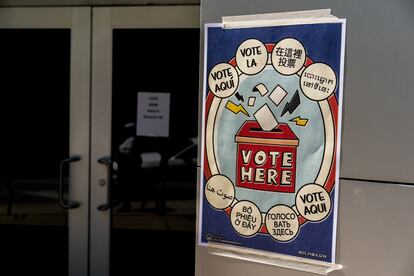Distrust, disillusionment and disenchantment: Abstention weighs on the Latino vote
An aversion to providing personal details, lack of knowledge of the voting system and the belief that their ballot doesn’t count diminishes Hispanic participation at the polls


Before coming to the state of Maryland, where he resides, Jorge Velázquez used to vote in Puerto Rico, his birthplace. Since leaving there more than a decade ago, he has not done so again. The 33-year-old works in a barbershop in Takoma Park and won’t exercise his right to vote in November either. “I’m not voting because I don’t think either candidate favors me. Biden is not known for working for Latinos and Trump is anti-immigrant,” he says. His wife is Salvadoran and has been in the process of regularization for a year, but he knows that there are compatriots who have been waiting for more than a decade to have their papers in order. He does not expect the process to move forward, whoever the winner is. Velázquez lives with his back to politics and there is no message that will make him change his mind.

Velázquez’s case is not isolated. There is a high rate of abstention among Latinos, especially among young people. Every 30 seconds a Latino turns 18, the legal voting age, and in what is expected to be a very close election they could prove a determining factor in who occupies the White House. More than 36 million Hispanics will be eligible to vote in November, four million more than in 2020. U.S. election law requires all voters to be registered and that is where the first stumbling block appears. While 72% of all voters registered to vote in 2020, only 61% of Latinos did so, according to census data.
Bonard Molina García, a 44-year-old lawyer who lives in the Washington metropolitan area, senses disenchantment among young people. “They need to vote, but they are disillusioned, disconnected from politics. They are potential votes, but they don’t understand the importance of voting,” says Molina, a Mexican-born U.S. citizen. His son Lucas, 19, has already registered and will vote for the first time this year.
Several organizations are dedicated to promoting voting among Latinos. With home visits, advertisements in the media, social networks, or booths in meeting places, they inform them, often in Spanish, how to register and what their rights are. “We make them understand that those communities that have high voting rates are the ones that have better resources, better schools, hospitals. We also try to break one of the myths they may have from their countries of origin, where they think that the electoral process does not impact their lives,” says Frankie Miranda, president of the Hispanic Federation. They scored a victory this year when a federal judge blocked a Florida law that fined non-citizens $50,000 for registering others to vote. Many of the volunteers they work with only have green cards and the law would have had a negative impact on Latino registration.
The controversial identification
Lack of information and distrust of authorities in a system that has historically looked down on minorities discourages Hispanics from registering. “They don’t want to give information because they are afraid it will become public and hurt them,” notes Ameer Patel, program director of Voto Latino, an organization focused on encouraging young people to vote that aims to register half a million Hispanics before November.

The registration process is usually simple: fill out a form with first name, last name, and address. It can be done online, by mail, or in person. But the rules are different in each state, and in some the complication comes when a photo ID is required, which is mandatory in 21 states, including Georgia, Alabama, Florida, and North Carolina. In the latter, the National Association for the Advancement of Colored People (NAACP) has taken the law imposing this requirement to court on the grounds that it was implemented with discriminatory intent against African-Americans and Latinos, as they are twice as likely to lack it as non-Hispanic whites.
“One of the most common forms of photo identification is a driver’s license, but many don’t have it, especially if they live in urban areas, because they don’t have a car,” notes Angelica Razo, director of Latino voting programs and campaigns for Mi Familia en Acción. Another form of identification is a passport, “but not everyone has one, because it also requires an expense,” she adds. Texas is another state where photo ID is required and one where there is a higher concentration of Latinos: 32% of all voters. In the southern state, a student ID card is not valid for registration, but a firearms license is.
Proponents justify the ID requirement because it minimizes voter fraud. “Voting without ID damages the electoral system,” says Daniel Garza, president of the Libre Institute. In his opinion, those who advocate the opposite “demonize Republicans by saying they want to suppress the Latino vote, but that’s a lie.”
His organization is part of the Vota Conmigo campaign, launched this month by the Spanish-language network Univision to promote Latino electoral participation, and which has been joined by several entities with opposing political positions. “It’s not about politics, it’s about empowering the Latino voice,” says Teri Arvesu, head of the campaign. Ricky Martin, Luis Fonsi, and Roselyn Sánchez participated in previous ads and the network is in the process of recruiting other celebrities.
Another obstacle in some states is the impossibility of voting by mail. Many Latinos cannot leave their jobs to stand in long lines to exercise their right to vote. Celia Salmerón, a 54-year-old Salvadoran who works as a hairdresser on the outskirts of the District of Columbia, did not vote in the last election. She has been in the United States for 41 years and has been a citizen for 20. “I never had time to go. It’s easier if they mail it. You don’t have to wait in line so long,” she says. Latino organizations complain that in areas where minorities live, there are fewer places to vote and the lines can be several hours long. As a result, laws such as the one in Georgia that prohibits offering water or food to those waiting their turn to vote have proven very controversial. In eight states, including California and Nevada — where 33% and 22% of voters are Latino, respectively —, the ballot is received by mail without the need to request it.

But for participation among Latinos to improve, in addition to overcoming logistical hurdles, they need to feel they are part of society. Flavia Rodríguez, Mexican by birth, runs a cosmetics and nutrition business in Maryland. Although she has lived in the United States for 29 of her 51 years, she denounces the discrimination her family has suffered. She assures that the treatment worsened during Donald Trump’s presidency and that her daughters “suffered at school for having Hispanic surnames. In the library classmates would ask them if they worked in cleaning,” she recalls. Although she claims to have voted for Joe Biden in 2020, she believes that it is not in the Latino culture to make her vote count: “We feel it is not important, that’s why we don’t vote. Also because we don’t know what is going on, we are focused on surviving.”
Sign up for our weekly newsletter to get more English-language news coverage from EL PAÍS USA Edition
Tu suscripción se está usando en otro dispositivo
¿Quieres añadir otro usuario a tu suscripción?
Si continúas leyendo en este dispositivo, no se podrá leer en el otro.
FlechaTu suscripción se está usando en otro dispositivo y solo puedes acceder a EL PAÍS desde un dispositivo a la vez.
Si quieres compartir tu cuenta, cambia tu suscripción a la modalidad Premium, así podrás añadir otro usuario. Cada uno accederá con su propia cuenta de email, lo que os permitirá personalizar vuestra experiencia en EL PAÍS.
¿Tienes una suscripción de empresa? Accede aquí para contratar más cuentas.
En el caso de no saber quién está usando tu cuenta, te recomendamos cambiar tu contraseña aquí.
Si decides continuar compartiendo tu cuenta, este mensaje se mostrará en tu dispositivo y en el de la otra persona que está usando tu cuenta de forma indefinida, afectando a tu experiencia de lectura. Puedes consultar aquí los términos y condiciones de la suscripción digital.








































